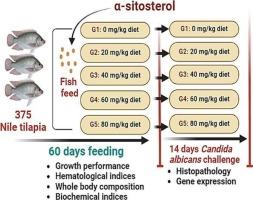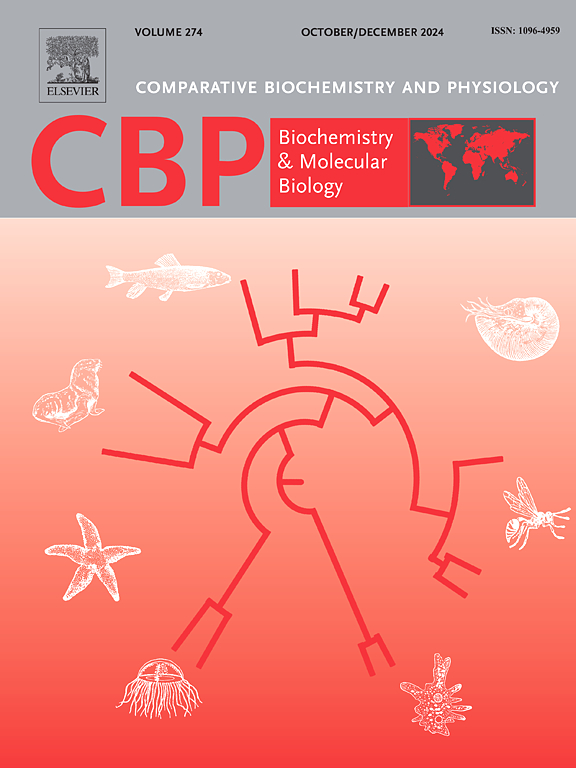α-谷甾醇对受到白色念珠菌挑战的尼罗罗非鱼(Oreochromis niloticus)的生长、血液生化特征、免疫抗氧化复原力、组织病理学特征和免疫凋亡基因表达的影响。
IF 1.8
3区 生物学
Q4 BIOCHEMISTRY & MOLECULAR BIOLOGY
Comparative Biochemistry and Physiology B-Biochemistry & Molecular Biology
Pub Date : 2024-09-21
DOI:10.1016/j.cbpb.2024.111035
引用次数: 0
摘要
本研究评估了日粮中添加米崎链霉菌代谢物(α-谷甾醇,0、20、40、60 和 80 mg/kg)对尼罗罗非鱼生长性能、抗氧化免疫稳定性和白色念珠菌抵抗力的影响。结果表明,在日粮中添加 60 和 80 毫克/千克剂量的 α-谷甾醇可显著提高尼罗罗非鱼的生长速度。摄入 80 毫克/千克α-谷甾醇的罗非鱼的高密度脂蛋白、总蛋白、球蛋白和白蛋白含量增加,肝肾损伤指标、血糖、甘油三酯、低密度脂蛋白和总胆固醇含量明显降低。膳食中的α-谷甾醇能显著提高肝胰脏谷胱甘肽过氧化物酶、超氧化物歧化酶和过氧化氢酶的活性,并明显降低丙二醛的水平。在膳食中添加 80 毫克/千克的α-谷甾醇可提高一氧化氮、补体-3、硝基蓝四氮唑水平、溶菌酶和吞噬细胞活性。特别是,在白僵菌挑战后,补充 60-80 毫克/千克α-谷甾醇能显著提高促/抗炎标志物(il1b、il10、tgfb、ifng、tnfa 和 il8)的表达。此外,累积死亡率、促凋亡标志物(casp3、bax 和 hsp70)也有所下降,而抗凋亡指标(bcl2)则有所增加。有趣的是,在接受白僵菌挑战后,摄入 0 和 20 毫克 α-谷甾醇/千克的鱼的肝胰脏、脾脏和肠道表现出明显的炎症。另一方面,投喂 60-80 毫克 α-谷甾醇/千克可缓解炎症。基于这些发现,α-谷甾醇可作为一种创新选择,用于提高尼罗罗非鱼的生长、一般生理状态、免疫服务和对白僵菌的抗真菌能力。本文章由计算机程序翻译,如有差异,请以英文原文为准。

Effects of α-sitosterol on growth, hematobiochemical profiles, immune-antioxidant resilience, histopathological features and expression of immune apoptotic genes of Nile tilapia, Oreochromis niloticus, challenged with Candida albicans
In this study, the effect of the Streptomyces misakiensis metabolite (α- sitosterol, 0, 20, 40, 60, and 80 mg/kg) dietary supplementation on growth performance, antioxidant-immune stability and Candida albicans resistance of Nile tilapia was evaluated. The results revealed that the incorporation of α-sitosterol at doses of 60 and 80 mg/kg into the diet significantly improved the growth rate of Nile tilapia. The fish receiving 80 mg/kg showed an increased level of high-density lipoprotein, total protein, globulin, and albumin, and significantly reduced levels of indicators of hepato-renal damage, glucose, triglycerides, low-density lipoprotein, and total cholesterol. Dietary α-sitosterol induced a considerable increase in hepatopancreas glutathione peroxidase, superoxide dismutase and catalase activities and a significant drop in malondialdehyde levels. Supplementing the diet with 80 mg/kg of α-sitosterol increased nitric oxide, complement-3, nitro blue tetrazolium levels, lysozyme, and phagocytic activities. In particular, supplementing with α-sitosterol at 60–80 mg/kg of diet significantly enhanced the expression of pro/anti-inflammatory markers (il1b, il10, tgfb, ifng, tnfa and il8) after the C. albicans challenge. Also, there was a decrease in cumulative mortality percent, pro-apoptotic markers (casp3, bax and hsp70) and an increase in anti-apoptotic indicators (bcl2). Interestingly, following the C. albicans challenge, fish that received 0 and 20 mg α-sitosterol/kg exhibited significant inflammation in the hepatopancreas, spleen, and intestine. On the other hand, inflammation could be alleviated by feeding 60–80 mg α-sitosterol/kg. Due to these findings, α-sitosterol could be an innovative option to enhance growth, general physiological status, immune service, and antifungal resistance of Nile tilapia against C. albicans.
求助全文
通过发布文献求助,成功后即可免费获取论文全文。
去求助
来源期刊
CiteScore
4.60
自引率
4.50%
发文量
77
审稿时长
22 days
期刊介绍:
Comparative Biochemistry & Physiology (CBP) publishes papers in comparative, environmental and evolutionary physiology.
Part B: Biochemical and Molecular Biology (CBPB), focuses on biochemical physiology, primarily bioenergetics/energy metabolism, cell biology, cellular stress responses, enzymology, intermediary metabolism, macromolecular structure and function, gene regulation, evolutionary genetics. Most studies focus on biochemical or molecular analyses that have clear ramifications for physiological processes.

 求助内容:
求助内容: 应助结果提醒方式:
应助结果提醒方式:


